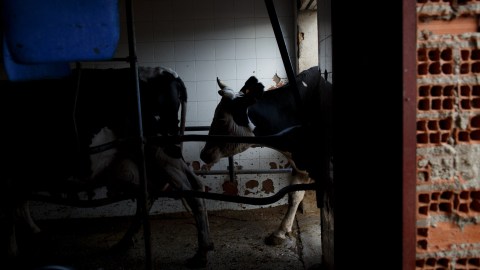Eating Fake Meat Could Be Worse for Animals than Factory Farming

The future of the planet and animal welfare would be better if developed countries stopped or reduced their consumption of meat. But switching from Turkey to Tofurkey doesn’t happen quickly, especially when it’s something that tastes so good. Even when confronted with the moral implications of our meat-eating ways, we justify our habits by rationalizing its consumption is necessary to live (and it tastes delicious).
It’s just not going to happen, explained Harvard University Primatologist, Richard Wrangham, in an interview with The Guardian: “It is a practical matter: people are going to continue wanting meat, and a system of meat production that reduces the environmental and ethical costs will be a great benefit.” Meat is cheap and meat tastes good, so pending a natural disaster that would force us to reduce our demand for meat, scientists have been developing an alternative solution.
“[I]f we stop or nearly stop raising livestock, then the sum of pig, cow, and chicken happiness in the world will be approximately zero.”
Enter: in vitro meat. It’s biologically identical to the real thing only it has been cultured in a lab, so it’s meat without the murder and the horrible, unsustainable conditions. It’s still a long way off from coming to market (there’s still an issue of producing it in a cost-effective way), but it could very well put a stop to all the environmental and moral issues surrounding livestock.
Julian Savulescu, Professor of Practical Ethics at the University of Oxford, agrees. She said in an interview with The Guardian: “Artificial meat stops cruelty to animals, is better for the environment, could be safer and more efficient, and even healthier. We have a moral obligation to support this kind of research. It gets the ethical two thumbs up.”
The truth of the matter is that extinction may be the best we can do. “It’s a shame if that’s the best we can do.”
Hold your applause for artificial meat, because it may not be the savior livestock and animal rights activists are looking for. Ben Levinstein and Anders Sandberg argue, on one hand, in vitro meat would put a stop to factory farms, which would in turn reduce the environmental impact of sustaining such an unsustainable product. But then what happens to all the livestock?
Levinstein and Sandberg write it would be something close to endangerment or extinction: “The basic reason: if we stop or nearly stop raising livestock, then the sum of pig, cow, and chicken happiness in the world will be approximately zero. Although the sum currently is very likely negative, it would be a shame if virtual extinction of these species is our best moral option.”
It’s easy to say what the solution should be: find ways to raise livestock in a more humane, less environmentally damaging way. One of the ways to do that is if market demand for meat were to go down, but that suggestion has already been put on the table. The truth of the matter is that extinction may be the best we can do. “It’s a shame if that’s the best we can do,” they write.
Eating meat is a part of our cultural and personal identity—think Christmas hams or Thanksgiving turkeys—but the factory farming system is not sustainable.
—
Natalie Shoemaker has been writing professionally for 6 years. After graduating from Ithaca College with a degree in Feature Writing, she snagged a job at PCMag.com where she had the opportunity to review all the latest consumer gadgets. Since then she has become a writer for hire, freelancing for various websites. In her spare time, you may find her riding her motorcycle, reading YA novels, hiking, or playing video games. Follow her on Twitter: @nat_schumaker
Photo courtesy of Getty Images





